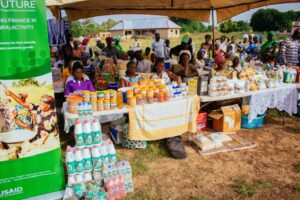Anaang Anabanye from Domaye, a community in the Wa West district, has transitioned from cutting trees for commercial purposes to focusing on sustainable agriculture.
Anabanye was interviewed as part of the International Day of Rural Women on Sunday during a community durbar at Naro in the Nadowli Kaleo district of Upper West Region.
She stated that upon recognising the environmental impact of tree-cutting, she and other rural women have shifted their efforts to nursing shea tree seedlings for planting.
“We used to cut trees for commercial purposes, but with time we realised that it is not good for the environment. So, we stopped and now focus on nursing shea tree seedlings to be planted. This change reflects a profound understanding of the impact from deforestation and a conscious decision to be part of the solution rather than the problem,” she narrated.
She highlighted the historical struggle faced by women who had to farm alongside their husbands due to a lack of their own lands.
“In rural communities like ours, where farming is a way of life, the role of women has often been relegated to supporting our husbands in the fields. In the past, we did not have land to farm but would have to farm with our husbands, which didn’t help. However, times have changed. We have now secured our own land for farming; a significant step toward autonomy and self-reliance,” she added.
Another woman, Memuna Abdul Rahman, discussed the difficulties she faces as a shea butter processor with journalists at Naro in the Nadowli Kaleo district, which is the event’s site.
“We are operating in a waterlogged area and unable to work during heavy rains due to flooding in our machine room. As a women’s group, we started building a new machine room up here, but we are not able to complete it. We therefore call on well-meaning Ghanaians to come to our aid, as the shea butter business is crucial for supporting our children in school and the community,” she narrated
The community durbar formed part of activities commemorating the International Day of Rural Women celebration, which is marked annually on October 16. The event was organised by the Women in Agricultural Development Directorate (WIAD) of the Ministry of Food and Agriculture (MoFA) in collaboration with the USAID-supported Feed the Future activities; including Policy LINK, Mobilising Finance in Agriculture (MFA), Market Systems Resilience (MSR) and Resilience in Northern Ghana (RING II), in order to honour and empower rural women in Ghana.
Emmanuel Sasu Yeboah, Regional Director of Agriculture in Upper West, delivered a speech underscoring the vital role of rural women in agriculture. He emphasised that despite being the backbone of agricultural labour, women face economic, social and political constraints, hindering their access to key resources.

Mr. Yeboah called for policies that address gender inequalities, ensuring the effective inclusion of rural women in agricultural development.
To celebrate the International Day for Rural Women, USAID in collaboration with its implementing partners organised a community durbar in Naro, Upper West, Ghana. The event brought together community leaders, government officials and over 300 rural women in agriculture.
The celebration included insightful radio discussions, policy dialogues and a fair aimed at empowering women with knowledge about available opportunities in the agricultural sector.










